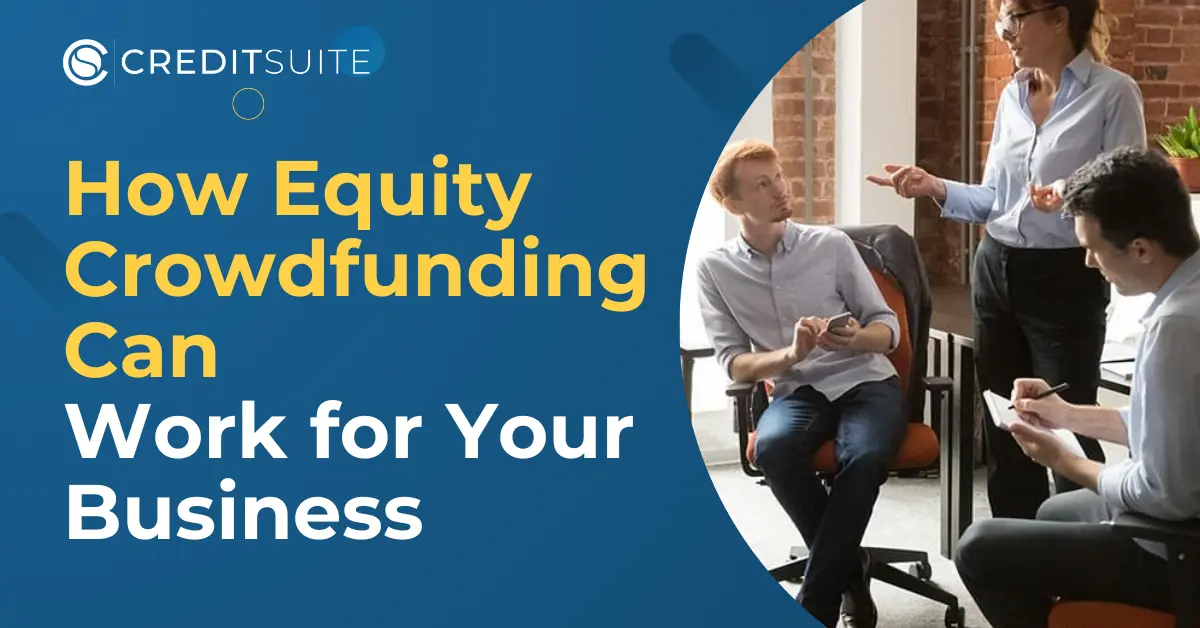If you are considering equity crowdfunding for your business, then you are, by definition, considering equity crowdfunding sites. We take a look at the best out there and dig into their nuances and differences. Make a smarter choice – knowledge is power! Note: companies in this space tend to change, merge, or add or drop offerings all the time. Your best bet is to visit their websites directly for the latest information.
What are the Best Equity Crowdfunding Sites All About?
 When you consider equity crowdfunding sites, you will need to take a number of factors into account. Crowdfunding is a way to get funds from a lot of people, versus one or two investors.
When you consider equity crowdfunding sites, you will need to take a number of factors into account. Crowdfunding is a way to get funds from a lot of people, versus one or two investors.
With equity crowdfunding, you raise cash through the sale of securities such as equity, debt, revenue share and more. These security sales would be coming from a company that is not listed on stock exchanges. Equity crowdfunding has been around for less than 10 years. It is not the same as rewards-based. Rewards-based crowdfunding comes from places such as Kickstarter.
Equity Crowdfunding Sites versus Rewards-Based Crowdfunding Sites
What are the differences between equity crowdfunding and rewards-based crowdfunding? The major difference is what investors get for their investment. With reward based crowdfunding, investors generally receive some incentive for their donation. That incentive is not equity in the company. But with equity-based crowdfunding, the investor receives equity. That is, they get a share in the company.
Also, as a general rule, equity-based crowdfunding brings in larger amounts of money. This is because it draws a different type of investor. So, how come not everyone choose that? The key is some businesses are better suited for equity-based crowdfunding than others.
Details on Equity Crowdfunding versus Rewards-Based Crowdfunding
With equity crowdfunding sites, you raise capital from the crowd online. Potential investors visit a funding portal website. There, they can explore different equity crowdfunding investment opportunities. Note: there are limits on how much capital an individual can invest based on their income and net worth. Plus, investors must be 18 years old, or older.
The main purpose of equity crowdfunding is to sell securities in a business. Hence, this is also the main purpose of equity crowdfunding sites.
In contrast, with a platform such as Kickstarter, businesses make money by pre-selling their products. But on equity crowdfunding sites, companies sell securities, in the form of equity in the company. Or it can be in the form of debt, revenue share, convertible note, and more. Equity crowdfunding gives investors a stake in your business.
What is in it for Equity Crowdfunding Investors?
Equity crowdfunding investors are playing a long game. They stand to make a profit if they make a good investment, and the company they invested in grows. Here, the business can create hundreds of brand ambassadors who want to see you succeed. They are an audience the company can depend on to spread the word about their business and share the product with their own networks.
The ability to cultivate reliable brand ambassadors can be one consideration when trying to offset the cost of equity crowdfunding on a platform
What is in it for Business Owners Hoping for Equity Crowdfunding?
The business owner gets to dictate terms. The entrepreneur raising capital has total control of the offering. So this is including what to sell, how much, and, at what price. The owner can set the terms, including their valuation and how much capital they hope to raise.
Companies can set a minimum funding goal along with their desired maximum. So if they do not fully reach their funding goal, the entrepreneur can still successfully raise capital. Those who want to invest can do so even if the market interest is not enough to reach the goal.
Businesses raising money via equity crowdfunding sites are private companies. A business using equity crowdfunding does not have to issue an IPO (initial public offering). The business does not have to become a fully reporting public company. this is helpful, as being a fully reporting public company is financially burdensome for most small businesses. Investors do not have to be accredited. A business can raise funds without having to turn to venture capitalists.
For more information, see forbes.com/sites/howardmarks/2018/12/19/what-is-equity-crowdfunding.
A Look at all the Best Equity Crowdfunding Sites
Crowdfunder
Crowdfunder is an equity crowdfunding platform. With Crowdfunder, investors purchase equity in promising companies. They consider campaigns to be deals, and its donors are investors.
Starter listings are $299 per month. Premium listings are $499 per month. In their community, there are over 130,000 entrepreneurs and investors.
Crowdfunder does not work with every industry.
The following are prohibited industries:
- Guns and Firearms
- Tobacco, Cigarettes, and Cannabis
- Pyramid Marketing
- Adult Products and Entertainment
- Gambling
- Contests and Raffles, and
- Illegal Substances and Drugs
For more information, see crowdfunder.com.
Fundable
Fundable is a crowdfunding for business platform. It allows companies to raise funds via equity sales. Those funds come from investors, customers, and friends. They have over $80 million in funding commitments.
Fundable will charge $179 per month to raise funds. Fees on rewards are: 3.5% + 30¢ per merchant processing transaction. They do not charge success fees.
Fundable is one of the equity crowdfunding sites (such as Crowdfunder and Fundrise, below) which seem to be more accessible to regular folks.
They do not seem to focus on just one specific industry.
For more information, see fundable.com.
Crowdstreet
What is so special about Crowdstreet?
The industry most likely to use equity crowdfunding is real estate. This is because real estate allows for a much larger asset to be there from the very start. For a startup company based upon an idea for a new product, there is extraordinarily little available to seize in case the investment goes south. Whereas with real estate, even if there is never any development, land has an intrinsic value no matter what.
Crowdstreet allows you to invest online in commercial realty. Investors can choose between direct investing, fund investing, or managed investing. Crowdstreet boasts over 101,000 investors and over 260 commercial real estate developers.
Direct investing has varied minimum investment amounts. The minimum for fund investing is $25,000. The minimum for managed investing is $250,000. Hence this is one of those equity crowdfunding sites that is more for professional investors.
For more information, see crowdstreet.com/marketplace/overview.
RealCrowd
Real Crowd is another real estate investing platform, via equity crowdfunding. RealCrowd charges a technology access fee to the operating partner for their services. They do not charge investors any upfront fees, ongoing asset management fees or promote/carried interest in the investments.
You can browse offerings before you sign up. The information includes minimum investment and average returns. This allows for a lot of the decision making to happen before you even log in. Real Crowd offerings are open to accredited investors.
For more information, see https://www.realcrowd.com/how-it-works.
Fundrise
Fundrise is a great starter site for those that want to break into the world of equity crowdfunding. They do not require that you be an accredited investor. The minimum investment for the starter account level is $500. Minimum investment amounts go all the way up to $100,000 for the premium account level.
Fundrise will charge 0.15% in annual advisory fees for managing your account through the online platform. They do not charge any transaction fees, sales commissions, or additional fees for enabling features on an account, such as dividend reinvestment or auto-invest.
Fundrise will also charge 0.85% in annual management fees for managing a Fundrise portfolio. They could potentially charge other fees, such as development or liquidation fees, for work on a specific project. Dividends earned are net of any fund fees.
For more information, see: https://fundrise.com.
Alternatives to Equity Crowdfunding
If you do not wish to give away any of your equity, then rest assured, you have other options. Build business credit is one option. And others include inventory financing, merchant cash advances (if you have sales coming in), and securities financing. With securities financing, you use your stocks, bonds, 401(k), or IRA as collateral for borrowing.
Another great option is our credit line hybrid.
A hybrid credit line could be just what you need.
The gist of a credit line hybrid is you can leverage good personal credit in order to get business funding. Because a good personal credit score is the main thing the lender is looking for, it can be perfect for a startup venture. So, it is another option to consider. You do not necessarily have to give up business equity in order to finance your entrepreneurial venture.
Equity Crowdfunding Sites: Takeaways
Equity crowdfunding involves calling on a crowd to invest in your project. Rather than pre-selling products, you are selling pieces of your business.
The industry most likely to use equity crowdfunding is real estate. But other industries can use equity crowdfunding. Be sure to check the platform and see if there are any restrictions. Some industries will not do well at all and may even be shut out by a platform. Fees and investment minimum amounts will vary widely.
If you are interested in equity crowdfunding for your business, the best thing you can do is to shop around. Rates vary dramatically. But also check on success rates. Many equity crowdfunding platforms are expensive, or they have high minimum investment amounts, or both. Do not waste your time and money if you are not sure there is a good fit.
And, if you decide equity crowdfunding is not for you – or even if you do but want a fall back – then consider other forms of business funding. That should always include building business credit.

